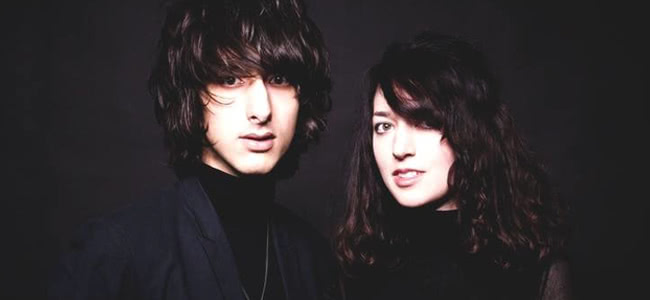Cat’s Eyes are an enigmatic duo, comprised of Italian-Canadian opera soprano and classical multi-instrumentalist Rachel Zeffira, and prowling frontman of British psych rockers The Horrors, Faris Badwan.
Their third album Treasure House (echoing The Horrors’ debut album Strange House) is always keeping you on your toes, the music at times delicate, sprawling, and ever-evolving, while at others veering more towards the raucous surf stylings of Badwan’s band. We spoke with Faris about the duo’s musical process, including their bonding over ’60s girl groups.
Treasure House is out now, and is available through iTunes.
This will be your first album together in five years; had much changed (creatively or otherwise) between the albums, or did it all seem pretty familiar? Do you approach making music together differently than when you’re making music with your other projects?
We have been working non-stop so it’s hard for us to tell, really. We have never made conscious decisions to alter our creative process as there’s not really any need. The Duke of Burgundy soundtrack we composed involved a different process which we both really enjoyed – we were able to write themes based on the script and develop the pieces as the filming began to take shape. In terms of writing songs, for the most part we write for one instrument and voice, and build from there. I’m more interested in amplified sound, whereas Rachel is more familiar with acoustic.
What was it like working with Steve Osborne on this LP?
Steve is an exceptional producer – he can play a wide range of instruments and he specialises in rhythm, which is definitely my weak point. We’ve been working with him for the whole Cat’s Eyes project – all three records – and he knows us and our way of working pretty well by now. We like to build up layers and layers of sound and then strip things away, and he’s really good at helping us achieve dynamic within the songs. We aren’t a band and we don’t write songs by playing live – they are studio creations that we then figure out how to recreate in the live setting.
What is Treasure House about? What themes do you two enjoy exploring the most?
Our songs are all fairly autobiographical, even if the final product ends up slightly surreal, as was the case in ‘Drag’. As with the first record, Treasure House is a document of our relationship really – almost an audio diary.
Who would you consider to be your main inspirations?
Once a record is underway – it sounds a little weird – but we don’t really listen to other people’s music. It’s more about making decisions that are best for the individual songs rather than directly referencing anyone else. We end up taking more inspiration from our own lives.
The video for your single ‘Drag’ is pretty unforgettable. How did it come together? Is there a particular message you wanted people to take from the clip?
The ‘Drag’ video was a surrealist take on the idea of gossip and people making assumptions about other people’s relationships – the idea that you never know what goes on behind closed doors. It wasn’t about making light of any sensitive issues – there are no victims in the video and that was an important aspect for us. We wanted the violence to be equal.
From a technical standpoint, it was a really interesting video to shoot, as we had a stunt coordinator who showed us how to fall and how to hit each other, which was something I’d never taken instruction on before.
We’ve read that Cat’s Eyes came together after “Badwan introduced Zeffira to 1960s girl group music”. What is it about girl group music that is so fascinating to you two?
I have always collected 1960s girl group records – it was a rich period for music and particularly sonic experimentation within the confines of pop structures. Regardless of the actual sound of our songs – because there are loads of different directions we would like to go in – this sums our ethos up pretty well: experimentation within pop song structures. We write simple, melodic songs and try to create atmosphere within them.
We’ve seen the term ‘doom-wop’ used when describing your sound, would you cal that an accurate description? Why?
I don’t really take those kind of labels that seriously, or not seriously enough to discuss them. Someone also described us as “brat pop” the other day and, given the fact that we are both overgrown children, I thought that was funny.
What are your plans for the rest of 2016?
We have several surprises up our sleeves that we don’t want to ruin by giving away.




































